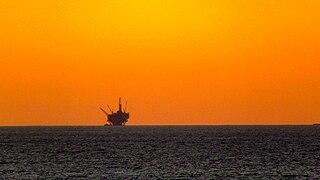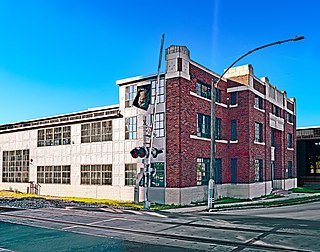
An oil platform is a large structure with facilities to extract and process petroleum and natural gas that lie in rock formations beneath the seabed. Many oil platforms will also have facilities to accommodate the workers, although it is also common to have a separate accommodation platform bridge linked to the production platform. Most commonly, oil platforms engage in activities on the continental shelf, though they can also be used in lakes, inshore waters, and inland seas. Depending on the circumstances, the platform may be fixed to the ocean floor, consist of an artificial island, or float. In some arrangements the main facility may have storage facilities for the processed oil. Remote subsea wells may also be connected to a platform by flow lines and by umbilical connections. These sub-sea facilities may include one or more subsea wells or manifold centres for multiple wells.

Offshore construction is the installation of structures and facilities in a marine environment, usually for the production and transmission of electricity, oil, gas and other resources. It is also called maritime engineering.
OMV Petrom S.A. is a Romanian integrated oil company, controlled by Austria's OMV. It is one of the largest corporations in Romania and the largest oil and gas producer in Southeast Europe. Since 2004 it is a subsidiary of OMV. With 2022 profits of EUR 12.5 billion, as of 2023, OMV Petrom is the largest company in Romania.

Offshore drilling is a mechanical process where a wellbore is drilled below the seabed. It is typically carried out in order to explore for and subsequently extract petroleum that lies in rock formations beneath the seabed. Most commonly, the term is used to describe drilling activities on the continental shelf, though the term can also be applied to drilling in lakes, inshore waters and inland seas.
Subsea technology involves fully submerged ocean equipment, operations, or applications, especially when some distance offshore, in deep ocean waters, or on the seabed. The term subsea is frequently used in connection with oceanography, marine or ocean engineering, ocean exploration, remotely operated vehicle (ROVs) autonomous underwater vehicles (AUVs), submarine communications or power cables, seafloor mineral mining, oil and gas, and offshore wind power.
Peregrino is an oil field located offshore of Brazil, east of Rio de Janeiro, in the southwest part of the Campos Basin area with about 2.3 billion barrels of oil in place within the sanctioned area. The oil field was discovered in 2004 and was formerly known as Chinook.
GSP Saturn is a semi-submersible, jackup independent leg cantilever drilling rig operated by GSP Drilling, a Grup Servicii Petroliere subsidiary, and currently contracted by Wintershall Noordzee for drilling in the North Sea. The drilling unit is registered in Panama.
GSP Jupiter is a semi-submersible, jackup independent leg cantilever drilling rig operated by GSP Drilling, a Grup Servicii Petroliere subsidiary, and currently laid up in the port of Limassol.
GSP Atlas is a four-legged jack-up rig, cantilever type with self-elevating unit operated by Grup Servicii Petroliere.
GSP Orizont is a semi-submersible, jackup independent leg cantilever drilling rig operated by GSP Drilling, a Grup Servicii Petroliere subsidiary, and currently contracted by Iranian Offshore Engineering and Construction Company for drilling in the Iranian section of the Persian Gulf. The drilling unit is registered in Malta.
GSP Prometeu is a jackup independent leg cantilever drilling rig operated by GSP Drilling, a Grup Servicii Petroliere subsidiary, and currently contracted by Melrose Resources for drilling in the Bulgarian section of the Black Sea. The drilling unit is registered in Malta.

Cameron International Corporation (formerly Cooper Cameron Corporation (CCC) and Cooper Oil Tool, Cameron Iron Works) though now operating under Schlumberger, is a global provider of pressure control, production, processing, and flow control systems as well as project management and aftermarket services for the oil and gas and process industries. Cameron was acquired by Schlumberger (SLB) in 2016, and now operates as 'Cameron, a Schlumberger Company.' At the start of the SLB acquisition in 2015, Cameron employed approximately 23,000 people and delivered $9.8 billion in revenue.

Ezra Holdings Ltd, also known under their operating brand name of EMAS, is an integrated offshore support provider for the oil and gas industry. The business was founded in 1992 and is headquartered in Singapore. Ezra was listed on the Singapore Exchange Securities Trading Limited (SESDAQ) and promoted to Mainboard on 8 December 2005.

EMAS is an offshore contractor and integrated offshore solutions provider catering to the oil and gas (O&G) industry on a global scale. It operates as a subsidiary of Ezra Holdings and has gained recognition within the industry. Established in 1992, the company is headquartered in Singapore and initially focused its operations in the maritime sector of the Asia Pacific region, primarily managing a fleet of vessels. In 2003, the company successfully listed its shares on the Singapore Exchange SGX, enhancing its market presence. EMAS also established fabrication facilities in Vietnam.

InterMoor is a global mooring, foundations, and subsea services company. Its services include rig moves, mooring and offshore operations such as engineering and design, survey and positioning, fabrication, subsea installation and chain inspections.
Petroiran Development Company Limited is an oil and gas company based in Tehran, Iran. It is a subsidiary of Naftiran Intertrade, a part of the National Iranian Oil Company, responsible for developing upstream oil projects. The company was established in 1997 and in 1999 it was registered in St. Helier, Jersey.
An Emergency Disconnect Package (EDP) is a piece of equipment used in the drilling and work-over of deep sea oil & gas wells, by Mobile Offshore Drilling Rigs (MODU's) and Well Intervention Vessels (WIV's). The EDP is designed for use in an emergency, when the MODU or WIV needs to quickly disconnect, and move away from the oil/gas well that it is drilling or working-over. Examples of when this might be necessary include unexpected extreme weather that exceeds the MODU/Vessel's capability to maintain its position.

Gulf Drilling International Limited (GDI) is a Qatari Shareholding Company based in West Bay, Doha.
The Missing Iranian oil rig or Fortuna rig, is a corruption scandal in which an oil rig, the GSP Fortuna, was bought by the Iranian government for US$88 million, but was never delivered. The case attracted major attention in Iran and abroad.








